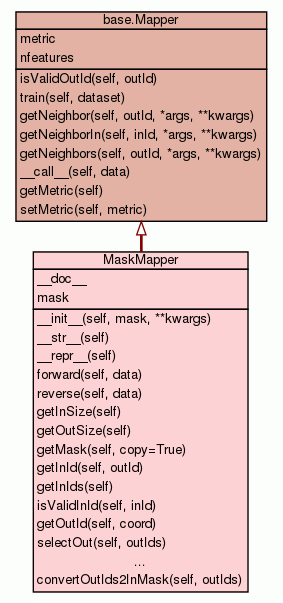
| Home | Trees | Indices | Help |
|
|---|
|
|

|
|||
|
|||
|
|||
|
|||
|
|||
|
|||
|
|||
|
|||
|
|||
|
|||
|
|||
|
|||
|
|||
|
|||
|
|||
|
|||
|
|||
|
|||
|
Inherited from Inherited from |
|||
|
|||
__doc__ = enhancedDocString('MaskMapper', locals(), Mapper)
|
|||
mask = property(fget= lambda self: self.getMask(False))
|
|||
|
Inherited from |
|||
|
|||
|
Inherited from |
|||
|
|||
|
|
|
Initialize internal state with mask-derived information It is needed to initialize structures for the fast and reverse lookup to don't impose performance hit on any future operation |
|
|
|
|
By default returns a copy of the current mask. If 'copy' is set to False a reference to the mask is returned instead. This shared mask must not be modified! |
Returns a features coordinate in the original data space for a given feature id. If this method is called with a list of feature ids it returns a 2d-array where the first axis corresponds the dimensions in 'In' dataspace and along the second axis are the coordinates of the features on this dimension (like the output of NumPy.array.nonzero()). XXX it might become __get_item__ access method
|
Validate id in IN space. Override if IN space is not simly a 1D vector
|
Only listed outIds would remain. Function assumes that outIds are sorted. In __debug__ mode selectOut would check if obtained IDs are sorted and would warn the user if they are not. If you feel strongly that you need to remap features internally (ie to allow Ids with mixed order) please contact developers of mvpa to discuss your use case. The function used to accept a matrix-mask as the input but now it really has to be a list of IDs
|
outIds selected.
|
Returns a boolean mask with all features in This method works exactly like Mapper.convertOutIds2OutMask(), but the feature mask is finally (reverse) mapped into in-space.
|
| Home | Trees | Indices | Help |
|
|---|
| Generated by Epydoc 3.0.1 on Mon Apr 23 23:09:28 2012 | http://epydoc.sourceforge.net |